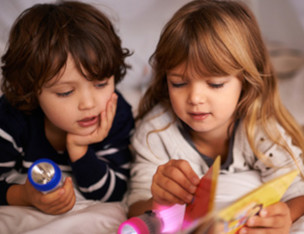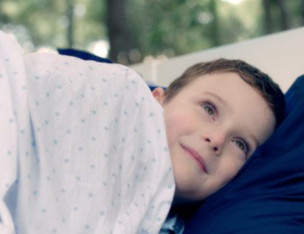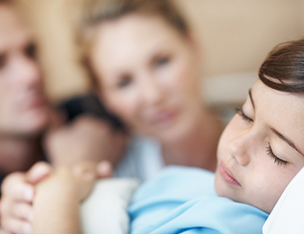Top Ten Bedwetting Tips
Kiwi parents could be losing as much as 10,000 hours of sleep a night and families are dealing with about 17,000 extra hours of washing each day due to children who are not yet ready to be dry at night. Bedwetting is something that most children grow out of, so in the meantime here are 10 simple recommended tips to keep in mind.
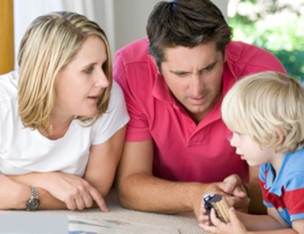
#1
Children are ready to be dry at night at different ages. There is no set pattern.
#2
Let your child lead. It’s best if mum, dad and caregivers can relax and be patient, knowing that your child cannot be trained to be dry at night.
#3
If your child happens to wet their bed, be gentle. The hormone that tells their body to make less urine at night may not have kicked in yet, the waking response to a full bladder may not be fully developed or their bladder may not yet be big enough to hold all the urine they make while they are sleeping. Children’s bodies reach these developmental milestones at varying times.
#4
Talk openly and honestly with your child. Tell them it’s not their fault and that they will be ready to be dry at night in their own time. Explain this to older siblings too and silence any teasing. Help your child feel confident about going to bed.
#5
It can be genetic. If one parent experienced bedwetting as a child then there is a 40% chance a child will too. If both parents experienced it, the chances for a child increase to 75%.
#6
Once your child is toilet-trained during the day but is not yet ready to be dry at night, offer them absorbent, disposable pyjama pants like HUGGIES® DRYNITES® Pyjama Pants. They look and feel like pyjama pants, have age-appropriate designs and absorbency, and are disposable and discreet. It’s a simple way to safeguard precious sleep and minimise extra washing while also looking out for your child’s self-esteem.
#7
Other ways you can support your child: encourage good hydration during the day (which can help with their bladder development), light up a night flight-path to the bathroom, and keep a supply of fresh PJs and sheets close by. For someone helpful to chat to, phone PlunketLine or talk to your Plunket Nurse.
#8
Even when children have had a long run of being dry at night, it is not unusual for some to have the occasional slip-up past school age. Little things like a change in routine at home, a new baby in the family or even a bad dream can cause a slip-up. Know that it’s not a return to bedwetting as your child has already shown he or she is able to be dry at night. With a no-fuss approach and your loving support, they are likely to get back into the pattern of dry nights again.
#9
For school camps, sleep-overs or holidays where the risk of a slip-up could be a little higher than usual, they will feel reassured and in control if you arrange (together) to slip a pair of disposable, absorbent pyjama pants into the bottom of their sleeping bag. They can then wriggle into them at night and out of them in the morning, undercover.
#10
If your child is experiencing regular bedwetting past age 7, talk to your GP. Clinical Nurse Specialists at your local DHB are also trained to provide support for children and their parents.

DryNites® Night Time Pants
DryNites® Night Time Pants are a discreet, comfortable and absorbent form of bedtime protection.
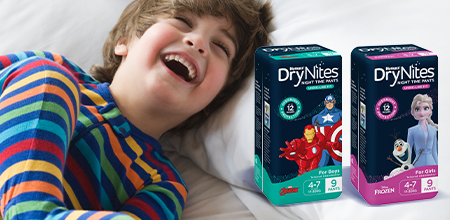
DryNites® Request a sample
DryNites® Night Time Pants help kids stay dry. Request a free DryNites® Night Time Pants sample today.


